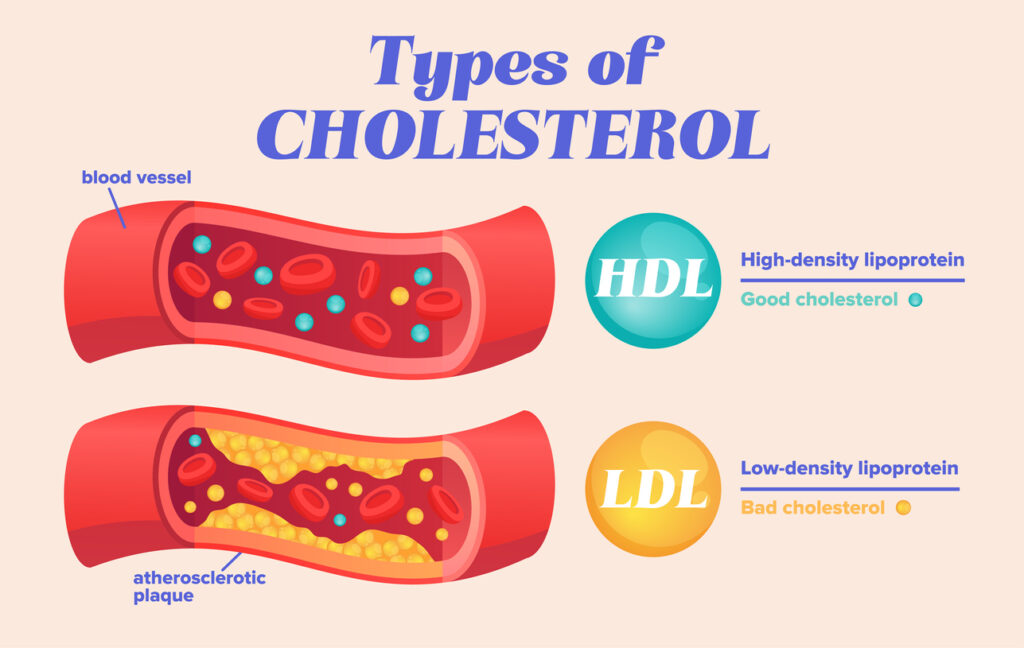We have all heard about cholesterol at one point or another – but did you know that there are “good” and “bad” types? Despite popular belief, not all cholesterol is indicative of cardiovascular risk. On the contrary, by better understanding your cholesterol levels – both the good and the bad – we can begin to paint a more holistic picture of our heart health, which, in turn, allows us to make more informed medical decisions.
When it comes to your heart, knowledge is power. Accordingly, here’s everything you need to know about cholesterol – including what it is and how to test for it.

What Is Cholesterol?
Cholesterol is an oily substance that your liver naturally produces to build cells, vitamins and hormones – but too much of it can spell trouble for your health. Our bodies typically produce plenty of cholesterol naturally, so when you eat too many animal products (meat, poultry and dairy), which contain dietary cholesterol, you risk exceeding the amount your body needs to stay healthy. These foods also contain saturated and trans fats, which cause your liver to produce even more cholesterol.
High cholesterol levels put you at risk for cardiovascular diseases such as heart disease and stroke. That’s why it’s vital to regularly test your cholesterol and keep track of your numbers in close consultation with your doctor.
What Is the Difference Between LDL and HDL Cholesterol?
There are two different types of cholesterol: low-density lipoprotein (LDL), sometimes called “bad” cholesterol, and high-density lipoprotein (HDL), otherwise known as “good” cholesterol. Each type is named for the lipoprotein that carries cholesterol to and from our cells.
LDL makes up most of your body’s cholesterol. Since this is the type of cholesterol that gradually causes plaque buildup in the arteries (atherosclerosis), a high LDL number is a risk factor for cardiovascular disease.
HDL, on the contrary, absorbs cholesterol in the blood and carries it back to the liver, which then flushes it from the body. Since you don’t want too much cholesterol in your blood, high HDL levels actually lower your risk of heart disease and stroke, making it a helpful tool in the pursuit of heart health.
How to Get Your Cholesterol Numbers
When evaluating your cholesterol, your doctor will likely look at your total blood cholesterol number, which includes your LDL number, your HDL number and a percentage of total triglycerides (the body’s most plentiful type of fat). The American Heart Association recommends that you get this test at least every four to six years – and more frequently if you have diabetes, are a smoker or have high blood pressure.
Controlling Cholesterol
Once you know your cholesterol, it’s important to work with your doctor to outline a treatment plan that works best for you. In some instances, for example, lifestyle changes, such as a combination of healthy diet and regular exercise can be used to help lower your cholesterol. For more severe cases, however, medication may be required – particularly if you are of a certain age (40-75) or have preexisting heart conditions. At Cue®, we believe that regular testing is a critical first step in keeping your heart strong and healthy. For these reasons and more, we just announced a new Lipid Panel that allows you to closely track your levels from the comfort of your own home. To learn more, visit our website.
This information is presented in summary form, general in nature, and for informational purposes only. Content is not intended nor recommended to substitute for professional medical advice. For personal medical advice, always consult your doctor or other qualified healthcare professional. The tests offered are subject to change and subject to availability. Due to state restrictions, this Cue Product is not available for individuals located in the state of New York. Other state restrictions may apply for specific tests. Please refer to our support page for detailed product terms and conditions.
References:
- https://www.heart.org/en/health-topics/cholesterol
- https://www.healthline.com/health/hdl-vs-ldl-cholesterol#hdl-vs-ldl
- https://www.heart.org/en/health-topics/cholesterol/about-cholesterol/what-your-cholesterol-levels-mean
- https://www.heart.org/en/health-topics/cholesterol/prevention-and-treatment-of-high-cholesterol-hyperlipidemia/cooking-to-lower-cholesterol
- https://www.heart.org/en/healthy-living/fitness/getting-active/how-to-move-more-anytime-anywhere



